Organizational Behaviour Report: Introvert vs Extrovert Personalities
VerifiedAdded on 2022/10/18
|10
|2359
|30
Report
AI Summary
This report delves into the concepts of introversion and extroversion within the context of organizational behavior, drawing upon personality assessments and the arguments presented in Susan Cain's "Quiet." The report begins with a case summary outlining the significance of personality in shaping individual attitudes and behaviors, highlighting the "power of quiet" often associated with introverted individuals. It explores the arguments presented by Cain, emphasizing the societal undervaluation of introverted traits. The report then classifies the author's personality based on self-assessment and external perspectives using the Myers-Briggs Type Indicator, identifying them as an Idealist and an Inspector, respectively. The author expresses a preference for introversion, citing the calm behavior and thoughtful approach it fosters, and agrees with Cain's arguments, emphasizing the suppression of introverted traits and the tendency to overlook the abilities of quieter individuals. The report concludes by differentiating between shyness and introversion and reinforcing the idea that social desirability influences how individuals are categorized.
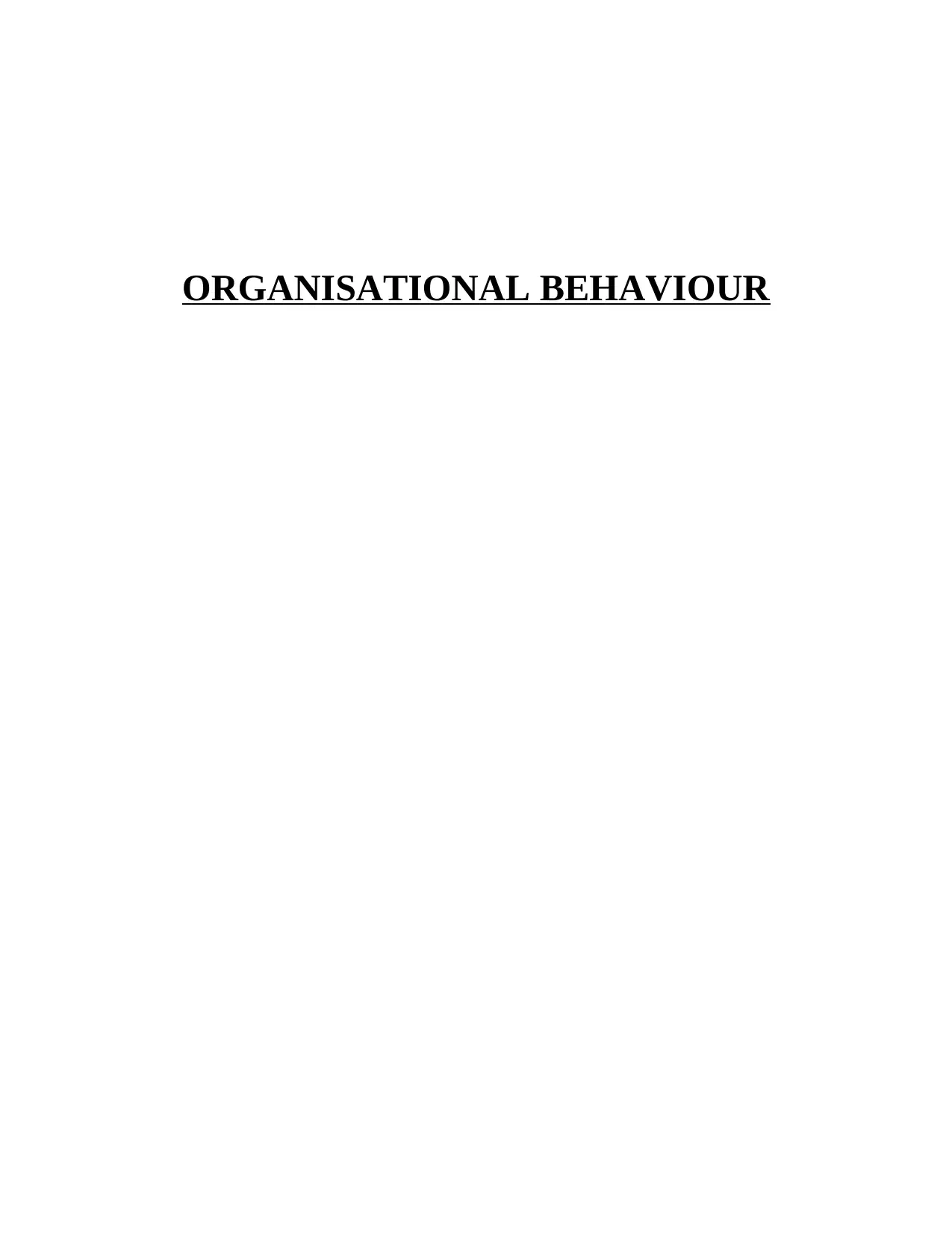
ORGANISATIONAL BEHAVIOUR
Paraphrase This Document
Need a fresh take? Get an instant paraphrase of this document with our AI Paraphraser
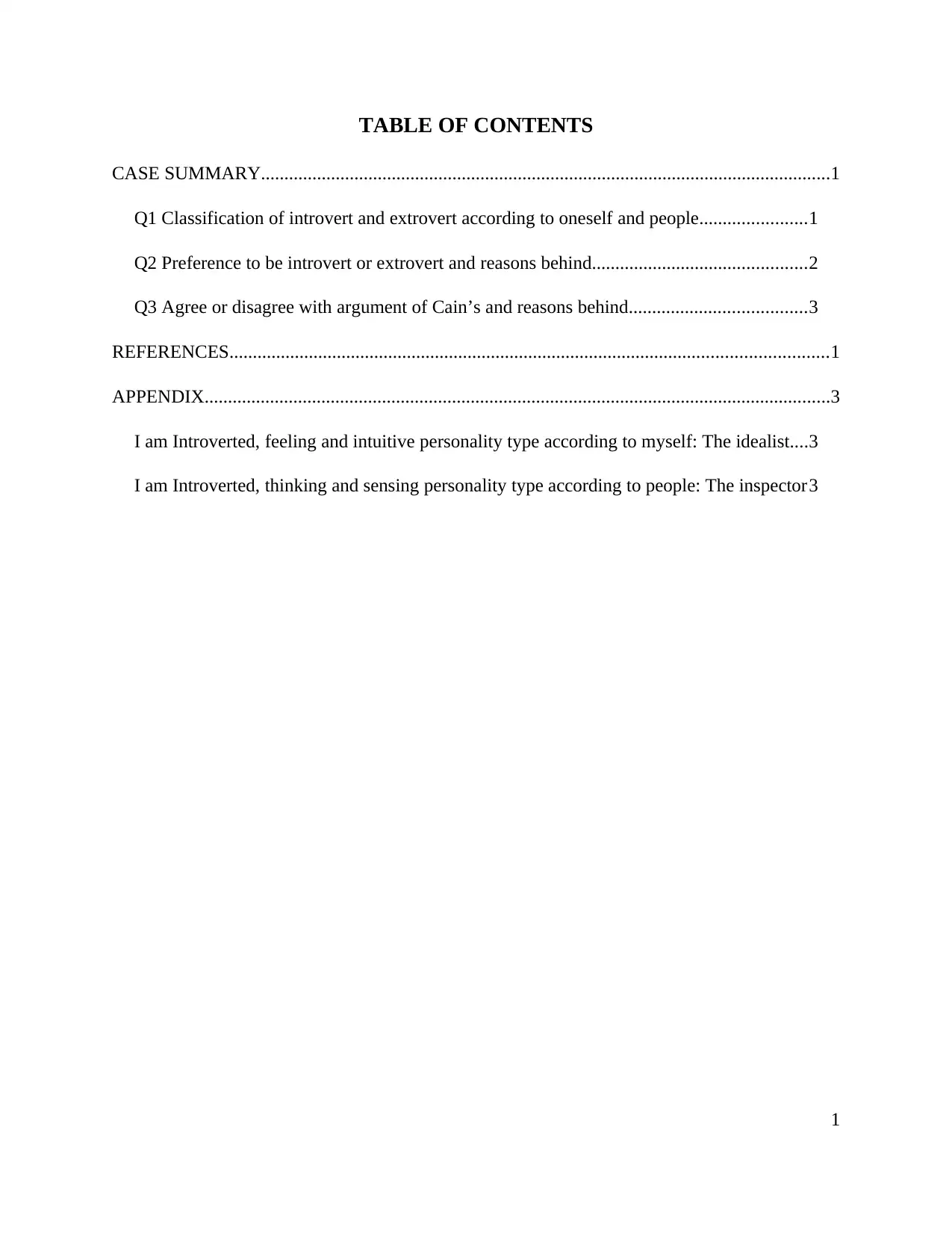
TABLE OF CONTENTS
CASE SUMMARY..........................................................................................................................1
Q1 Classification of introvert and extrovert according to oneself and people.......................1
Q2 Preference to be introvert or extrovert and reasons behind..............................................2
Q3 Agree or disagree with argument of Cain’s and reasons behind......................................3
REFERENCES................................................................................................................................1
APPENDIX......................................................................................................................................3
I am Introverted, feeling and intuitive personality type according to myself: The idealist....3
I am Introverted, thinking and sensing personality type according to people: The inspector3
1
CASE SUMMARY..........................................................................................................................1
Q1 Classification of introvert and extrovert according to oneself and people.......................1
Q2 Preference to be introvert or extrovert and reasons behind..............................................2
Q3 Agree or disagree with argument of Cain’s and reasons behind......................................3
REFERENCES................................................................................................................................1
APPENDIX......................................................................................................................................3
I am Introverted, feeling and intuitive personality type according to myself: The idealist....3
I am Introverted, thinking and sensing personality type according to people: The inspector3
1
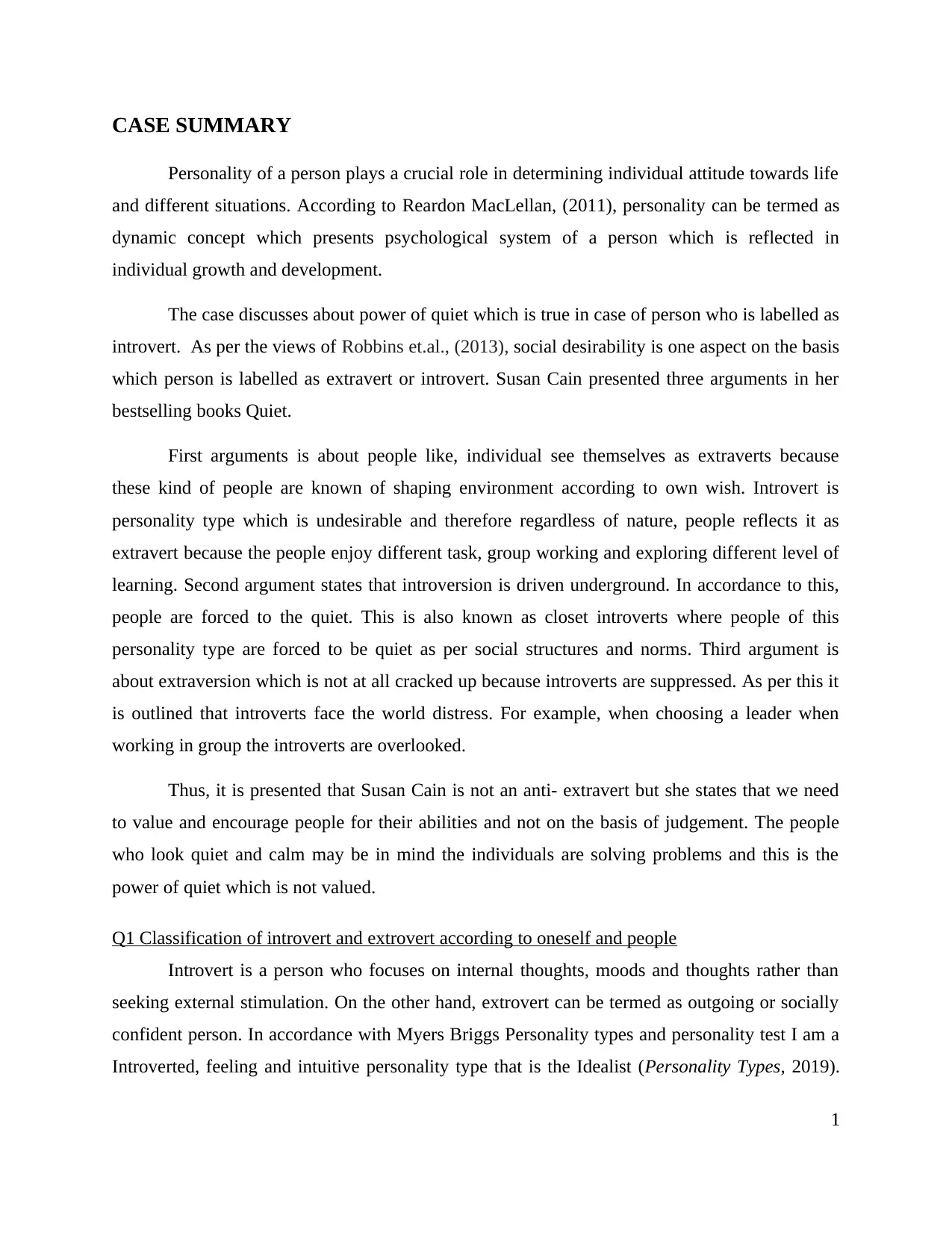
CASE SUMMARY
Personality of a person plays a crucial role in determining individual attitude towards life
and different situations. According to Reardon MacLellan, (2011), personality can be termed as
dynamic concept which presents psychological system of a person which is reflected in
individual growth and development.
The case discusses about power of quiet which is true in case of person who is labelled as
introvert. As per the views of Robbins et.al., (2013), social desirability is one aspect on the basis
which person is labelled as extravert or introvert. Susan Cain presented three arguments in her
bestselling books Quiet.
First arguments is about people like, individual see themselves as extraverts because
these kind of people are known of shaping environment according to own wish. Introvert is
personality type which is undesirable and therefore regardless of nature, people reflects it as
extravert because the people enjoy different task, group working and exploring different level of
learning. Second argument states that introversion is driven underground. In accordance to this,
people are forced to the quiet. This is also known as closet introverts where people of this
personality type are forced to be quiet as per social structures and norms. Third argument is
about extraversion which is not at all cracked up because introverts are suppressed. As per this it
is outlined that introverts face the world distress. For example, when choosing a leader when
working in group the introverts are overlooked.
Thus, it is presented that Susan Cain is not an anti- extravert but she states that we need
to value and encourage people for their abilities and not on the basis of judgement. The people
who look quiet and calm may be in mind the individuals are solving problems and this is the
power of quiet which is not valued.
Q1 Classification of introvert and extrovert according to oneself and people
Introvert is a person who focuses on internal thoughts, moods and thoughts rather than
seeking external stimulation. On the other hand, extrovert can be termed as outgoing or socially
confident person. In accordance with Myers Briggs Personality types and personality test I am a
Introverted, feeling and intuitive personality type that is the Idealist (Personality Types, 2019).
1
Personality of a person plays a crucial role in determining individual attitude towards life
and different situations. According to Reardon MacLellan, (2011), personality can be termed as
dynamic concept which presents psychological system of a person which is reflected in
individual growth and development.
The case discusses about power of quiet which is true in case of person who is labelled as
introvert. As per the views of Robbins et.al., (2013), social desirability is one aspect on the basis
which person is labelled as extravert or introvert. Susan Cain presented three arguments in her
bestselling books Quiet.
First arguments is about people like, individual see themselves as extraverts because
these kind of people are known of shaping environment according to own wish. Introvert is
personality type which is undesirable and therefore regardless of nature, people reflects it as
extravert because the people enjoy different task, group working and exploring different level of
learning. Second argument states that introversion is driven underground. In accordance to this,
people are forced to the quiet. This is also known as closet introverts where people of this
personality type are forced to be quiet as per social structures and norms. Third argument is
about extraversion which is not at all cracked up because introverts are suppressed. As per this it
is outlined that introverts face the world distress. For example, when choosing a leader when
working in group the introverts are overlooked.
Thus, it is presented that Susan Cain is not an anti- extravert but she states that we need
to value and encourage people for their abilities and not on the basis of judgement. The people
who look quiet and calm may be in mind the individuals are solving problems and this is the
power of quiet which is not valued.
Q1 Classification of introvert and extrovert according to oneself and people
Introvert is a person who focuses on internal thoughts, moods and thoughts rather than
seeking external stimulation. On the other hand, extrovert can be termed as outgoing or socially
confident person. In accordance with Myers Briggs Personality types and personality test I am a
Introverted, feeling and intuitive personality type that is the Idealist (Personality Types, 2019).
1
⊘ This is a preview!⊘
Do you want full access?
Subscribe today to unlock all pages.

Trusted by 1+ million students worldwide
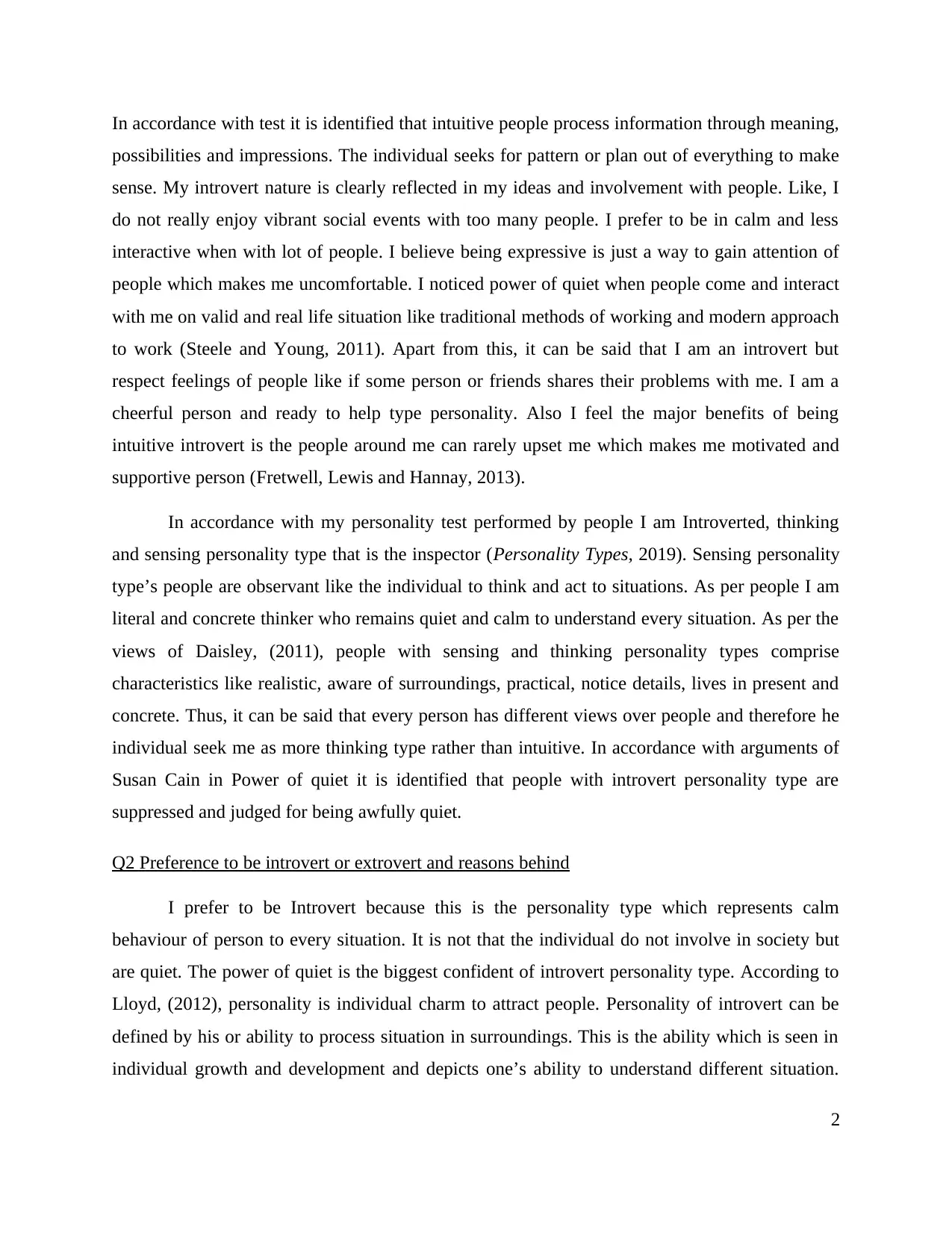
In accordance with test it is identified that intuitive people process information through meaning,
possibilities and impressions. The individual seeks for pattern or plan out of everything to make
sense. My introvert nature is clearly reflected in my ideas and involvement with people. Like, I
do not really enjoy vibrant social events with too many people. I prefer to be in calm and less
interactive when with lot of people. I believe being expressive is just a way to gain attention of
people which makes me uncomfortable. I noticed power of quiet when people come and interact
with me on valid and real life situation like traditional methods of working and modern approach
to work (Steele and Young, 2011). Apart from this, it can be said that I am an introvert but
respect feelings of people like if some person or friends shares their problems with me. I am a
cheerful person and ready to help type personality. Also I feel the major benefits of being
intuitive introvert is the people around me can rarely upset me which makes me motivated and
supportive person (Fretwell, Lewis and Hannay, 2013).
In accordance with my personality test performed by people I am Introverted, thinking
and sensing personality type that is the inspector (Personality Types, 2019). Sensing personality
type’s people are observant like the individual to think and act to situations. As per people I am
literal and concrete thinker who remains quiet and calm to understand every situation. As per the
views of Daisley, (2011), people with sensing and thinking personality types comprise
characteristics like realistic, aware of surroundings, practical, notice details, lives in present and
concrete. Thus, it can be said that every person has different views over people and therefore he
individual seek me as more thinking type rather than intuitive. In accordance with arguments of
Susan Cain in Power of quiet it is identified that people with introvert personality type are
suppressed and judged for being awfully quiet.
Q2 Preference to be introvert or extrovert and reasons behind
I prefer to be Introvert because this is the personality type which represents calm
behaviour of person to every situation. It is not that the individual do not involve in society but
are quiet. The power of quiet is the biggest confident of introvert personality type. According to
Lloyd, (2012), personality is individual charm to attract people. Personality of introvert can be
defined by his or ability to process situation in surroundings. This is the ability which is seen in
individual growth and development and depicts one’s ability to understand different situation.
2
possibilities and impressions. The individual seeks for pattern or plan out of everything to make
sense. My introvert nature is clearly reflected in my ideas and involvement with people. Like, I
do not really enjoy vibrant social events with too many people. I prefer to be in calm and less
interactive when with lot of people. I believe being expressive is just a way to gain attention of
people which makes me uncomfortable. I noticed power of quiet when people come and interact
with me on valid and real life situation like traditional methods of working and modern approach
to work (Steele and Young, 2011). Apart from this, it can be said that I am an introvert but
respect feelings of people like if some person or friends shares their problems with me. I am a
cheerful person and ready to help type personality. Also I feel the major benefits of being
intuitive introvert is the people around me can rarely upset me which makes me motivated and
supportive person (Fretwell, Lewis and Hannay, 2013).
In accordance with my personality test performed by people I am Introverted, thinking
and sensing personality type that is the inspector (Personality Types, 2019). Sensing personality
type’s people are observant like the individual to think and act to situations. As per people I am
literal and concrete thinker who remains quiet and calm to understand every situation. As per the
views of Daisley, (2011), people with sensing and thinking personality types comprise
characteristics like realistic, aware of surroundings, practical, notice details, lives in present and
concrete. Thus, it can be said that every person has different views over people and therefore he
individual seek me as more thinking type rather than intuitive. In accordance with arguments of
Susan Cain in Power of quiet it is identified that people with introvert personality type are
suppressed and judged for being awfully quiet.
Q2 Preference to be introvert or extrovert and reasons behind
I prefer to be Introvert because this is the personality type which represents calm
behaviour of person to every situation. It is not that the individual do not involve in society but
are quiet. The power of quiet is the biggest confident of introvert personality type. According to
Lloyd, (2012), personality is individual charm to attract people. Personality of introvert can be
defined by his or ability to process situation in surroundings. This is the ability which is seen in
individual growth and development and depicts one’s ability to understand different situation.
2
Paraphrase This Document
Need a fresh take? Get an instant paraphrase of this document with our AI Paraphraser
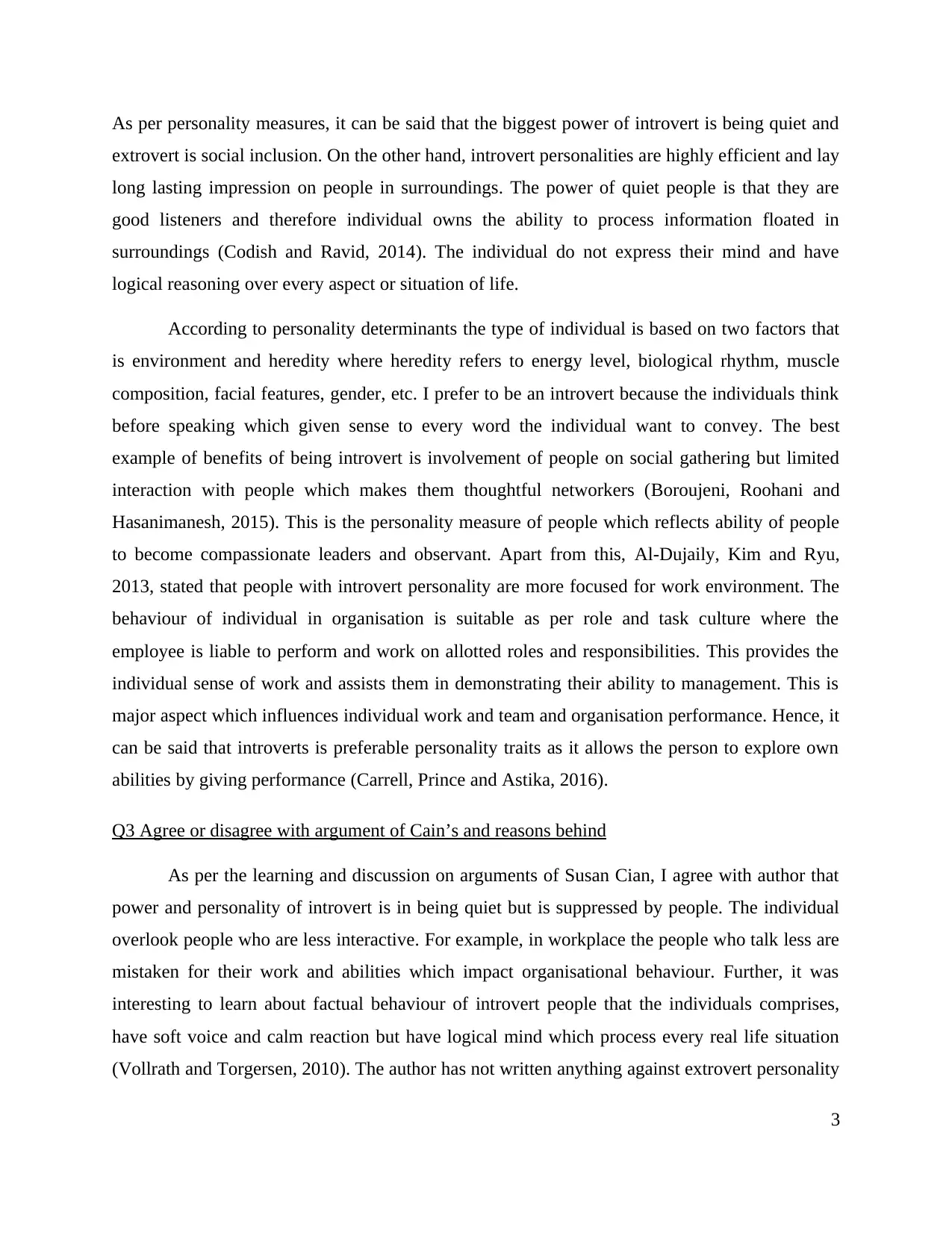
As per personality measures, it can be said that the biggest power of introvert is being quiet and
extrovert is social inclusion. On the other hand, introvert personalities are highly efficient and lay
long lasting impression on people in surroundings. The power of quiet people is that they are
good listeners and therefore individual owns the ability to process information floated in
surroundings (Codish and Ravid, 2014). The individual do not express their mind and have
logical reasoning over every aspect or situation of life.
According to personality determinants the type of individual is based on two factors that
is environment and heredity where heredity refers to energy level, biological rhythm, muscle
composition, facial features, gender, etc. I prefer to be an introvert because the individuals think
before speaking which given sense to every word the individual want to convey. The best
example of benefits of being introvert is involvement of people on social gathering but limited
interaction with people which makes them thoughtful networkers (Boroujeni, Roohani and
Hasanimanesh, 2015). This is the personality measure of people which reflects ability of people
to become compassionate leaders and observant. Apart from this, Al-Dujaily, Kim and Ryu,
2013, stated that people with introvert personality are more focused for work environment. The
behaviour of individual in organisation is suitable as per role and task culture where the
employee is liable to perform and work on allotted roles and responsibilities. This provides the
individual sense of work and assists them in demonstrating their ability to management. This is
major aspect which influences individual work and team and organisation performance. Hence, it
can be said that introverts is preferable personality traits as it allows the person to explore own
abilities by giving performance (Carrell, Prince and Astika, 2016).
Q3 Agree or disagree with argument of Cain’s and reasons behind
As per the learning and discussion on arguments of Susan Cian, I agree with author that
power and personality of introvert is in being quiet but is suppressed by people. The individual
overlook people who are less interactive. For example, in workplace the people who talk less are
mistaken for their work and abilities which impact organisational behaviour. Further, it was
interesting to learn about factual behaviour of introvert people that the individuals comprises,
have soft voice and calm reaction but have logical mind which process every real life situation
(Vollrath and Torgersen, 2010). The author has not written anything against extrovert personality
3
extrovert is social inclusion. On the other hand, introvert personalities are highly efficient and lay
long lasting impression on people in surroundings. The power of quiet people is that they are
good listeners and therefore individual owns the ability to process information floated in
surroundings (Codish and Ravid, 2014). The individual do not express their mind and have
logical reasoning over every aspect or situation of life.
According to personality determinants the type of individual is based on two factors that
is environment and heredity where heredity refers to energy level, biological rhythm, muscle
composition, facial features, gender, etc. I prefer to be an introvert because the individuals think
before speaking which given sense to every word the individual want to convey. The best
example of benefits of being introvert is involvement of people on social gathering but limited
interaction with people which makes them thoughtful networkers (Boroujeni, Roohani and
Hasanimanesh, 2015). This is the personality measure of people which reflects ability of people
to become compassionate leaders and observant. Apart from this, Al-Dujaily, Kim and Ryu,
2013, stated that people with introvert personality are more focused for work environment. The
behaviour of individual in organisation is suitable as per role and task culture where the
employee is liable to perform and work on allotted roles and responsibilities. This provides the
individual sense of work and assists them in demonstrating their ability to management. This is
major aspect which influences individual work and team and organisation performance. Hence, it
can be said that introverts is preferable personality traits as it allows the person to explore own
abilities by giving performance (Carrell, Prince and Astika, 2016).
Q3 Agree or disagree with argument of Cain’s and reasons behind
As per the learning and discussion on arguments of Susan Cian, I agree with author that
power and personality of introvert is in being quiet but is suppressed by people. The individual
overlook people who are less interactive. For example, in workplace the people who talk less are
mistaken for their work and abilities which impact organisational behaviour. Further, it was
interesting to learn about factual behaviour of introvert people that the individuals comprises,
have soft voice and calm reaction but have logical mind which process every real life situation
(Vollrath and Torgersen, 2010). The author has not written anything against extrovert personality
3
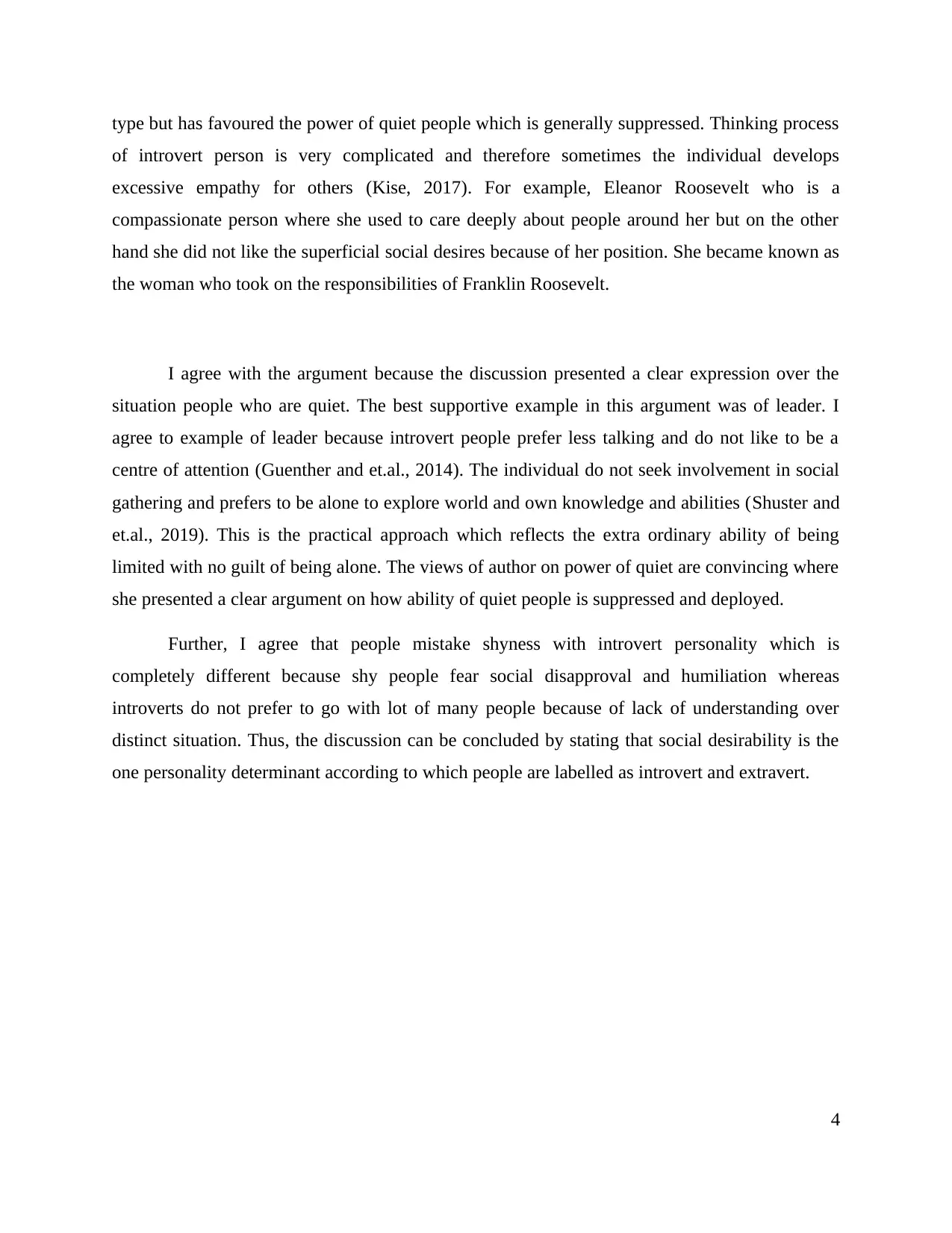
type but has favoured the power of quiet people which is generally suppressed. Thinking process
of introvert person is very complicated and therefore sometimes the individual develops
excessive empathy for others (Kise, 2017). For example, Eleanor Roosevelt who is a
compassionate person where she used to care deeply about people around her but on the other
hand she did not like the superficial social desires because of her position. She became known as
the woman who took on the responsibilities of Franklin Roosevelt.
I agree with the argument because the discussion presented a clear expression over the
situation people who are quiet. The best supportive example in this argument was of leader. I
agree to example of leader because introvert people prefer less talking and do not like to be a
centre of attention (Guenther and et.al., 2014). The individual do not seek involvement in social
gathering and prefers to be alone to explore world and own knowledge and abilities (Shuster and
et.al., 2019). This is the practical approach which reflects the extra ordinary ability of being
limited with no guilt of being alone. The views of author on power of quiet are convincing where
she presented a clear argument on how ability of quiet people is suppressed and deployed.
Further, I agree that people mistake shyness with introvert personality which is
completely different because shy people fear social disapproval and humiliation whereas
introverts do not prefer to go with lot of many people because of lack of understanding over
distinct situation. Thus, the discussion can be concluded by stating that social desirability is the
one personality determinant according to which people are labelled as introvert and extravert.
4
of introvert person is very complicated and therefore sometimes the individual develops
excessive empathy for others (Kise, 2017). For example, Eleanor Roosevelt who is a
compassionate person where she used to care deeply about people around her but on the other
hand she did not like the superficial social desires because of her position. She became known as
the woman who took on the responsibilities of Franklin Roosevelt.
I agree with the argument because the discussion presented a clear expression over the
situation people who are quiet. The best supportive example in this argument was of leader. I
agree to example of leader because introvert people prefer less talking and do not like to be a
centre of attention (Guenther and et.al., 2014). The individual do not seek involvement in social
gathering and prefers to be alone to explore world and own knowledge and abilities (Shuster and
et.al., 2019). This is the practical approach which reflects the extra ordinary ability of being
limited with no guilt of being alone. The views of author on power of quiet are convincing where
she presented a clear argument on how ability of quiet people is suppressed and deployed.
Further, I agree that people mistake shyness with introvert personality which is
completely different because shy people fear social disapproval and humiliation whereas
introverts do not prefer to go with lot of many people because of lack of understanding over
distinct situation. Thus, the discussion can be concluded by stating that social desirability is the
one personality determinant according to which people are labelled as introvert and extravert.
4
⊘ This is a preview!⊘
Do you want full access?
Subscribe today to unlock all pages.

Trusted by 1+ million students worldwide
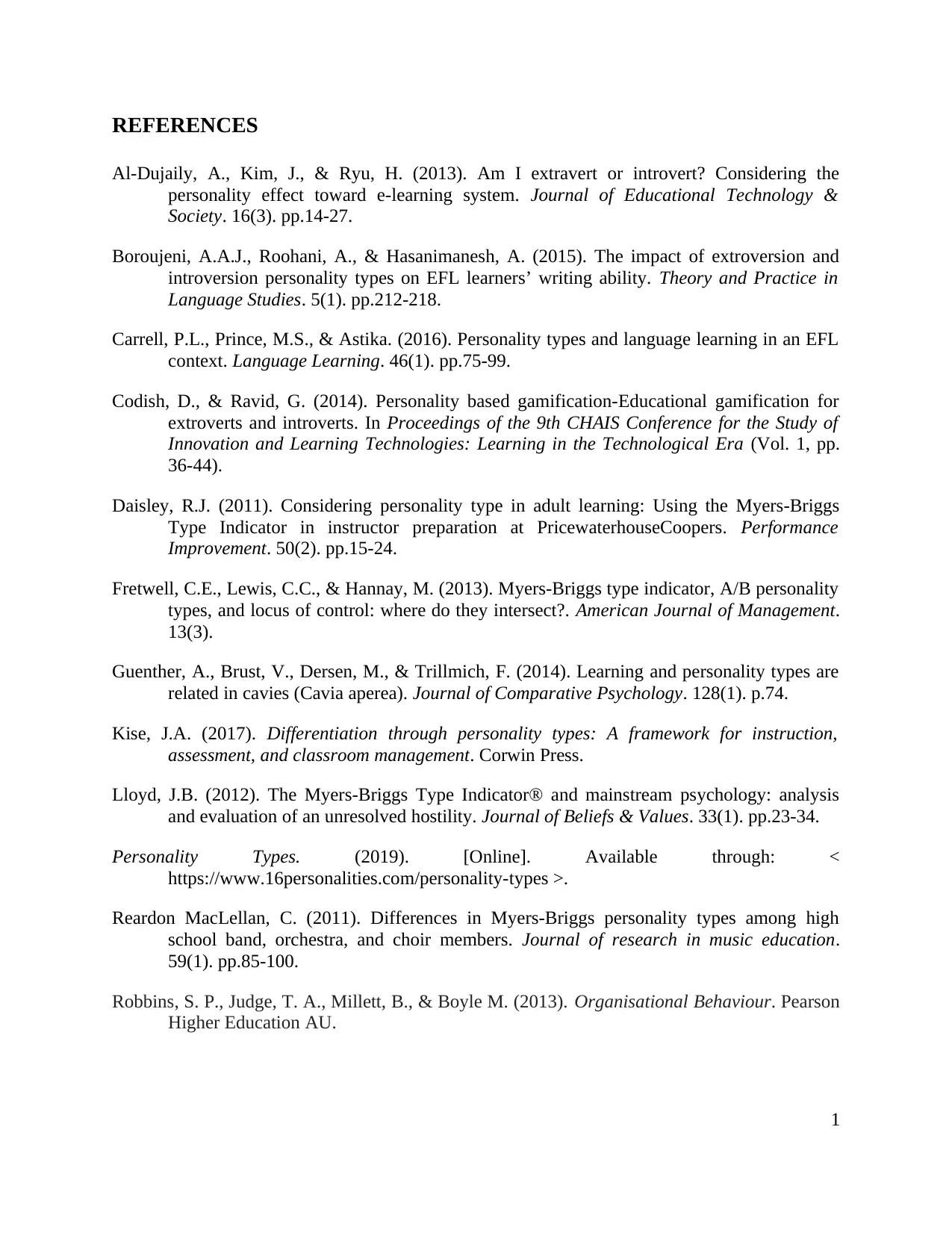
REFERENCES
Al-Dujaily, A., Kim, J., & Ryu, H. (2013). Am I extravert or introvert? Considering the
personality effect toward e-learning system. Journal of Educational Technology &
Society. 16(3). pp.14-27.
Boroujeni, A.A.J., Roohani, A., & Hasanimanesh, A. (2015). The impact of extroversion and
introversion personality types on EFL learners’ writing ability. Theory and Practice in
Language Studies. 5(1). pp.212-218.
Carrell, P.L., Prince, M.S., & Astika. (2016). Personality types and language learning in an EFL
context. Language Learning. 46(1). pp.75-99.
Codish, D., & Ravid, G. (2014). Personality based gamification-Educational gamification for
extroverts and introverts. In Proceedings of the 9th CHAIS Conference for the Study of
Innovation and Learning Technologies: Learning in the Technological Era (Vol. 1, pp.
36-44).
Daisley, R.J. (2011). Considering personality type in adult learning: Using the Myers‐Briggs
Type Indicator in instructor preparation at PricewaterhouseCoopers. Performance
Improvement. 50(2). pp.15-24.
Fretwell, C.E., Lewis, C.C., & Hannay, M. (2013). Myers-Briggs type indicator, A/B personality
types, and locus of control: where do they intersect?. American Journal of Management.
13(3).
Guenther, A., Brust, V., Dersen, M., & Trillmich, F. (2014). Learning and personality types are
related in cavies (Cavia aperea). Journal of Comparative Psychology. 128(1). p.74.
Kise, J.A. (2017). Differentiation through personality types: A framework for instruction,
assessment, and classroom management. Corwin Press.
Lloyd, J.B. (2012). The Myers-Briggs Type Indicator® and mainstream psychology: analysis
and evaluation of an unresolved hostility. Journal of Beliefs & Values. 33(1). pp.23-34.
Personality Types. (2019). [Online]. Available through: <
https://www.16personalities.com/personality-types >.
Reardon MacLellan, C. (2011). Differences in Myers-Briggs personality types among high
school band, orchestra, and choir members. Journal of research in music education.
59(1). pp.85-100.
Robbins, S. P., Judge, T. A., Millett, B., & Boyle M. (2013). Organisational Behaviour. Pearson
Higher Education AU.
1
Al-Dujaily, A., Kim, J., & Ryu, H. (2013). Am I extravert or introvert? Considering the
personality effect toward e-learning system. Journal of Educational Technology &
Society. 16(3). pp.14-27.
Boroujeni, A.A.J., Roohani, A., & Hasanimanesh, A. (2015). The impact of extroversion and
introversion personality types on EFL learners’ writing ability. Theory and Practice in
Language Studies. 5(1). pp.212-218.
Carrell, P.L., Prince, M.S., & Astika. (2016). Personality types and language learning in an EFL
context. Language Learning. 46(1). pp.75-99.
Codish, D., & Ravid, G. (2014). Personality based gamification-Educational gamification for
extroverts and introverts. In Proceedings of the 9th CHAIS Conference for the Study of
Innovation and Learning Technologies: Learning in the Technological Era (Vol. 1, pp.
36-44).
Daisley, R.J. (2011). Considering personality type in adult learning: Using the Myers‐Briggs
Type Indicator in instructor preparation at PricewaterhouseCoopers. Performance
Improvement. 50(2). pp.15-24.
Fretwell, C.E., Lewis, C.C., & Hannay, M. (2013). Myers-Briggs type indicator, A/B personality
types, and locus of control: where do they intersect?. American Journal of Management.
13(3).
Guenther, A., Brust, V., Dersen, M., & Trillmich, F. (2014). Learning and personality types are
related in cavies (Cavia aperea). Journal of Comparative Psychology. 128(1). p.74.
Kise, J.A. (2017). Differentiation through personality types: A framework for instruction,
assessment, and classroom management. Corwin Press.
Lloyd, J.B. (2012). The Myers-Briggs Type Indicator® and mainstream psychology: analysis
and evaluation of an unresolved hostility. Journal of Beliefs & Values. 33(1). pp.23-34.
Personality Types. (2019). [Online]. Available through: <
https://www.16personalities.com/personality-types >.
Reardon MacLellan, C. (2011). Differences in Myers-Briggs personality types among high
school band, orchestra, and choir members. Journal of research in music education.
59(1). pp.85-100.
Robbins, S. P., Judge, T. A., Millett, B., & Boyle M. (2013). Organisational Behaviour. Pearson
Higher Education AU.
1
Paraphrase This Document
Need a fresh take? Get an instant paraphrase of this document with our AI Paraphraser
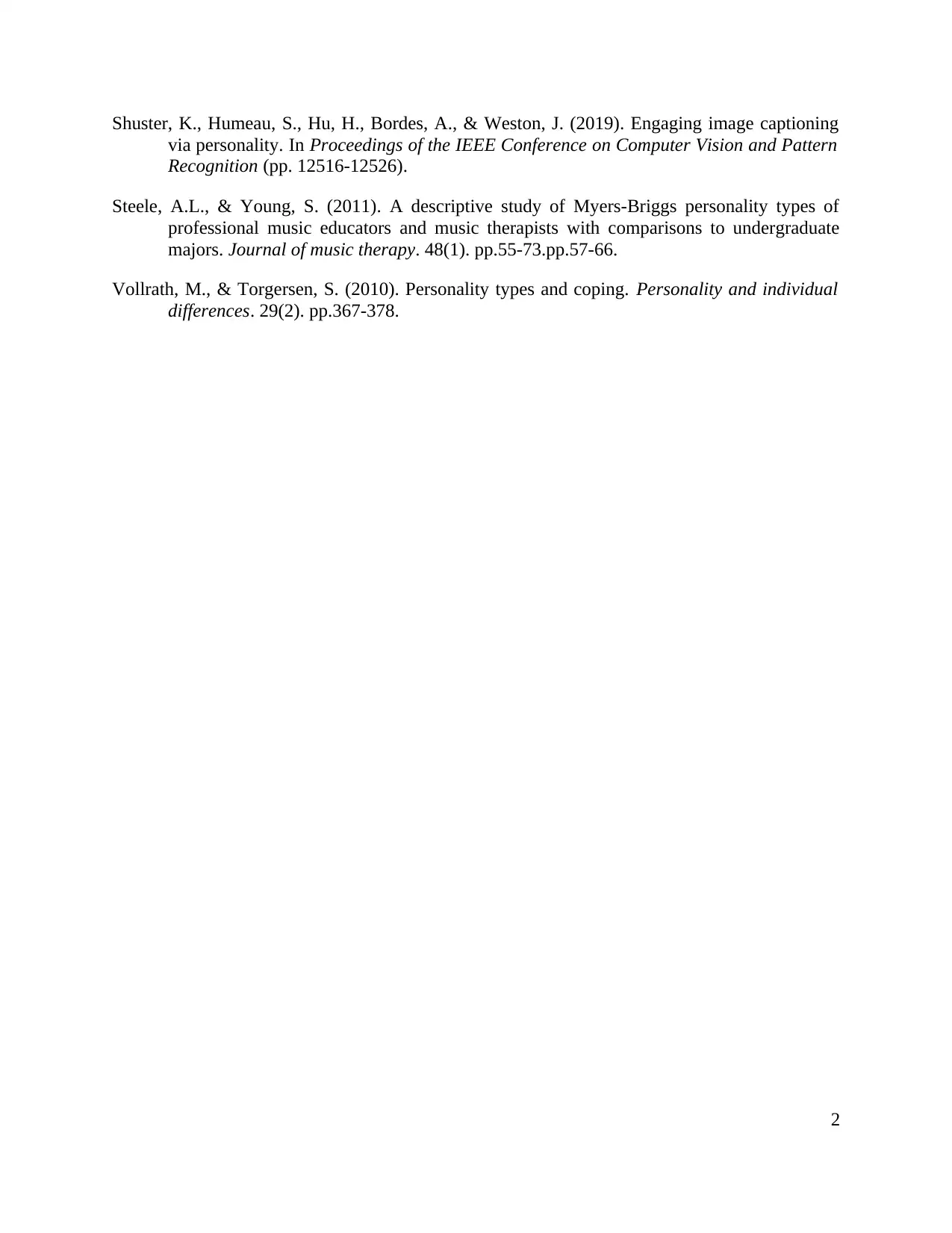
Shuster, K., Humeau, S., Hu, H., Bordes, A., & Weston, J. (2019). Engaging image captioning
via personality. In Proceedings of the IEEE Conference on Computer Vision and Pattern
Recognition (pp. 12516-12526).
Steele, A.L., & Young, S. (2011). A descriptive study of Myers-Briggs personality types of
professional music educators and music therapists with comparisons to undergraduate
majors. Journal of music therapy. 48(1). pp.55-73.pp.57-66.
Vollrath, M., & Torgersen, S. (2010). Personality types and coping. Personality and individual
differences. 29(2). pp.367-378.
2
via personality. In Proceedings of the IEEE Conference on Computer Vision and Pattern
Recognition (pp. 12516-12526).
Steele, A.L., & Young, S. (2011). A descriptive study of Myers-Briggs personality types of
professional music educators and music therapists with comparisons to undergraduate
majors. Journal of music therapy. 48(1). pp.55-73.pp.57-66.
Vollrath, M., & Torgersen, S. (2010). Personality types and coping. Personality and individual
differences. 29(2). pp.367-378.
2
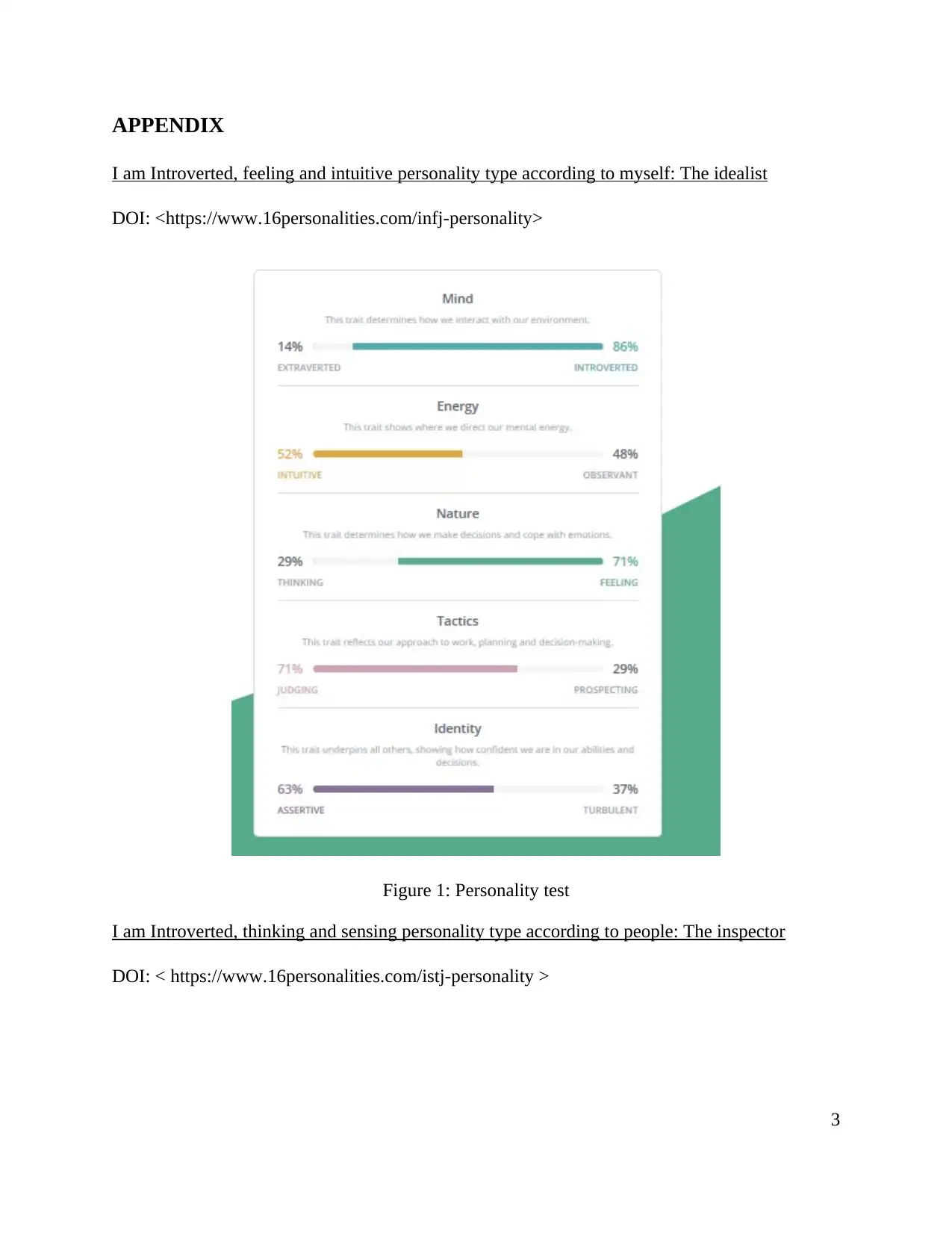
APPENDIX
I am Introverted, feeling and intuitive personality type according to myself: The idealist
DOI: <https://www.16personalities.com/infj-personality>
Figure 1: Personality test
I am Introverted, thinking and sensing personality type according to people: The inspector
DOI: < https://www.16personalities.com/istj-personality >
3
I am Introverted, feeling and intuitive personality type according to myself: The idealist
DOI: <https://www.16personalities.com/infj-personality>
Figure 1: Personality test
I am Introverted, thinking and sensing personality type according to people: The inspector
DOI: < https://www.16personalities.com/istj-personality >
3
⊘ This is a preview!⊘
Do you want full access?
Subscribe today to unlock all pages.

Trusted by 1+ million students worldwide
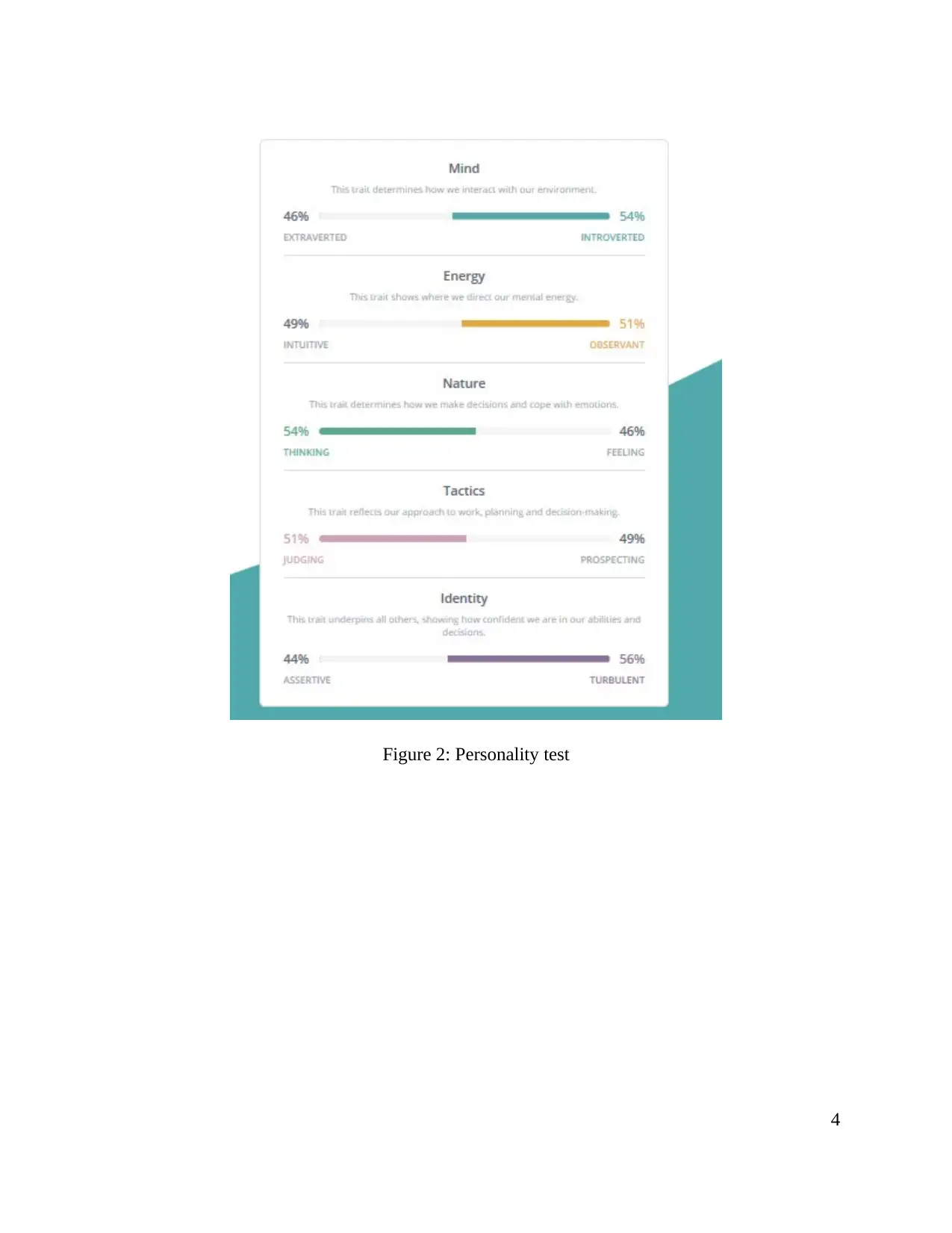
Figure 2: Personality test
4
4
1 out of 10
Related Documents
Your All-in-One AI-Powered Toolkit for Academic Success.
+13062052269
info@desklib.com
Available 24*7 on WhatsApp / Email
![[object Object]](/_next/static/media/star-bottom.7253800d.svg)
Unlock your academic potential
Copyright © 2020–2026 A2Z Services. All Rights Reserved. Developed and managed by ZUCOL.





